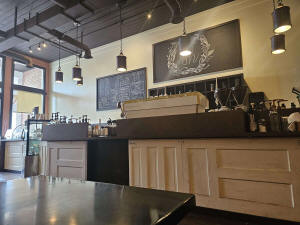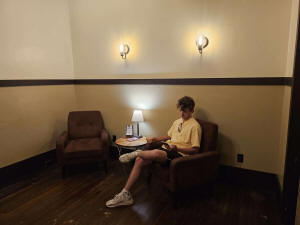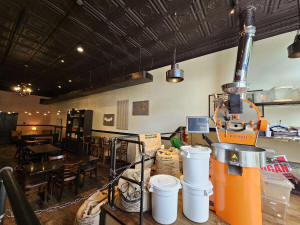Saturday Business Spotlight: Guest House; From Popcorn Poppers to
Community Pillars
[June 28, 2025] Ethan
Hoinacki’s earliest memories are laced with the scent of coffee.
“Grandpa always had coffee going,” he said. “It was the first thing
you’d smell waking up at his house.” Even as a kid, Ethan would sneak
sips from his mom’s mocha lattes—usually before or after
school—developing a taste for the rich, sweet drinks that would one day
change both his future and the city of Lincoln.
According to Ethan, in the early 1990s, long before Guest House existed,
Lincoln actually had its own little corner of coffee culture. A woman
downtown operated a small cart that served specialty drinks—espresso,
mochas, lattes—the kind of menu items that were still new and exciting
to small-town Illinois. “She was the first one I knew of serving lattes
in Lincoln,” Ethan said. She and her husband later opened a full-fledged
coffeehouse in a huge blue Victorian-style house on Keokuk Street,
across from Lincoln College. His uncle took his mom there for her first
mocha, and that was it—she was hooked.
“I’d steal sips out of my mom’s coffee. We’d go before school, and after
school. She was pretty much addicted to mocha lattes,” Ethan said,
laughing. “So, when you have a mocha, I think that's pretty much an
introduction to specialty coffee.” Thus, his caffeinated journey began.
In high school, he bought a cheap espresso machine from Walmart and
began experimenting with lattes and cappuccinos in his kitchen. “I
didn’t know what I was doing,” he admitted. “They were probably
terrible, but I liked what I was doing.” His love for coffee followed
him into college, where caffeine became both fuel and comfort. “In
college, coffee became a necessity. You know, staying up late, drinking
coffee to stay awake to do your research papers, hanging out with
friends.”
Ethan studied communications at Lincoln Christian University and took
business electives on the side. He and Nicole married in 2010 and moved
to northern Indiana, where they worked for a megachurch in a
Catholic-heavy area near Notre Dame. Eventually, they moved back to
Lincoln after the loss of Ethan’s grandmother. “Lincoln’s home,” he
said. “It takes a village to raise a family, and we wanted to be near
ours.”

Back in Lincoln, Ethan worked in financial services under his
grandfather. It was during this time that a Peoria café sparked his
curiosity—why did their coffee taste so different? He then discovered
the answer: they roasted their own beans. That single detail sent Ethan
down a rabbit hole.
“I found some groups online, and people were using popcorn poppers, and
they were like, “Just start with a half a cup of beans.” And so he did.
“I went to the thrift store and bought one because my wife said I wasn’t
allowed to use ours—she hates coffee, by the way.” In 2014, he started
home-roasting half a cup of beans at a time in his garage. He sourced
beans from online suppliers, learned about processing methods, and
taught himself how to roast using trial and error. He even admitted he
burned batches “all the time” and continued saying: “There’s no such
thing as failure—just figuring out one more way not to do something.”
Eventually, Ethan began dreaming bigger: what if he could sell his
beans? At the time, Illinois’ cottage food laws made that illegal. He
contacted then-state representative Tim Butler, who helped him push for
a change. “Nobody had thought to include coffee on the list,” Ethan
said. “They had bread and jam and cakes—but not coffee.” After nearly a
year of stalled communication with the state, the law was finally
amended. “We were the first people in Illinois to legally sell
home-roasted coffee at a farmers market,” he said. “And that was a God
thing. It was a miracle.”
Faith, Ethan said, has played a central role in every step of the
journey. “None of this works without God,” he said.
That same year, an indoor farmers market opened at the Logan County
Fairgrounds, and Ethan was one of the first vendors. He sold beans
roasted with a one-pound roaster his in-laws had gifted him for his
birthday. It was at that market that he met the owner of a local coffee
shop called By The Bean. “He asked if I’d ever thought about owning a
café,” Ethan said. “And I’m like no not really—but we took a leap of
faith.”
Ethan and Nicole bought the business, but quickly learned they couldn’t
keep the name due to a trademark conflict. They rebranded, hired a
consultant to train them on drink prep, and offered the old staff the
chance to reapply. “We worked 80-hour weeks,” Ethan said. “Open to
close, six in the morning to nine at night. We were figuring it out as
we went.” Eventually, they adjusted their hours, upgraded their
equipment, and leaned into family. Pastries were made from scratch using
inherited recipes—quiche from his grandmother, cinnamon rolls from his
aunt, sugar cookies from his sister.
The name “Guest House” came later, inspired by a mission trip Ethan took
in college. While visiting England, he stayed in a small guesthouse on a
physician’s property. “It had a living area, a kitchen, everything,” he
said. “We were guests, and every need was met. That stuck with me.” When
brainstorming names for the new shop, he remembered that experience. “We
want people to feel different when they leave—like they were known,
welcomed, like they matter.”

[to top of second column] |



That mission carries through every part of Guest House. The shop doesn’t
require a purchase to use the bathroom or stick around. It hosts
knitting circles, chess nights, weddings, even funeral gatherings.
“Coffee’s not hard to find,” Ethan said. “But a place where people can
stay a while and feel known? That’s rare.”
They’ve continued to grow. As Ethan’s roasting capacity increased—first
with a two-and-a-half pound roaster, then five—he eventually came into
possession of a larger machine stored in someone’s basement in
Bloomington. “That was a crazy story, too. Another—well, I would say—a
God thing,” Ethan said. “A guy from my church said, ‘Hey, I used to work
with this guy... he’s got a coffee roaster in his basement.’” They
bought it and used it until fall of 2023, when a fire damaged the
machine beyond repair.
Ethan posted in a roasting Facebook group, explaining what had happened
and asking for help. “This guy private messages me and says, ‘Hey, I
just placed an order to replace my roaster… I need to expand,’” Ethan
said. “He was selling exactly what I was looking for. What’s wild is—he
was a Christian too. He only lived 20 minutes away from my
brother-in-law in Bozeman, Montana.” Ethan packed up his family, hitched
a flatbed trailer to their Jeep, and drove across the country to
retrieve the machine. “God can use that tragedy, that loss—what could
potentially have really consumed the whole building—but we needed a
bigger roaster, and we found it… You can’t make that up.”

Now, the orange roaster at Guest House can handle 11-pound batches. They
roast specialty-grade beans—less than 2% of the world’s coffee
production—sourced from Peru, Brazil, Mexico, and beyond. Every batch is
cupped and profiled, every decaf bean processed naturally without
chemicals. “Even our decaf is Swiss water processed,” Ethan said. “No
shortcuts.”
The Hoinackis run the shop together, along with help from their three
kids: Sadie, Oliver, and Emmalin. “They think it’s fun—for now,” Ethan
said with a smile. “They help fold pastry boxes, clean, paint walls.
They love feeling responsible.” Each child even has their own mini
office upstairs. “I wouldn’t trade that for anything,” he said. “Letting
them be part of this—it matters.”

Nicole, who once hated the smell of coffee, has grown into her own role
at the shop. She helps with scheduling and now roasts beans herself.
“Sometimes I’ll ask, ‘Want me to roast tonight?’ and she’ll say, ‘No, I
need to get away from the kids—I’m going to roast,’” Ethan said. “It’s
peaceful in its own way.”
Even Sadie’s arrival into the world is tied into the community story of
Guest House. Diagnosed with a dangerous mass during pregnancy, she was
born early and rushed to Lurie Children’s Hospital in Chicago. While the
family waited, hundreds of people prayed. “We put up a blog,” Ethan
said. “People were logging on from all around the world. Some of them
didn’t even know us. But they prayed for her anyway.”
“That whole experience was a miracle,” he said. “We didn’t know if she’d
survive. But she did. God made a way.”
The support from Ethan’s church community has been just as foundational
as the bricks and mortar. “We go to Lincoln Christian Church, and if
there’s ever a prayer request, I can get on the app and just say, ‘Hey,
I need a prayer for something specific,’ and I’ll share it,” Ethan said.
“Then it gets sent to all the pastors. It gets sent to the elders. I’ve
had some of those people reach out to me, take me out to lunch if I’m
going through something or need covered in prayer. Yeah—super
supportive.”
Guest House Coffee has changed a lot over the years—from burnt garage
beans to locally famous pastries, from farmers markets to fire trucks on
roasting day. But its heartbeat has stayed the same: people first,
coffee second.
And it’s still growing, one cup at a time.
[Sophia Larimore] |